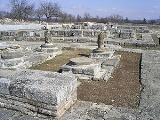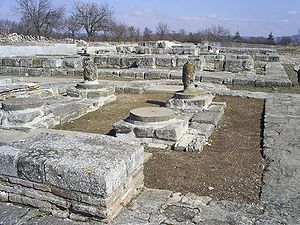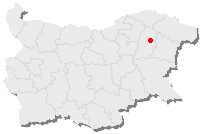
Pliska
Encyclopedia

Danube
The Danube is a river in the Central Europe and the Europe's second longest river after the Volga. It is classified as an international waterway....
Bulgaria
Bulgaria
Bulgaria , officially the Republic of Bulgaria , is a parliamentary democracy within a unitary constitutional republic in Southeast Europe. The country borders Romania to the north, Serbia and Macedonia to the west, Greece and Turkey to the south, as well as the Black Sea to the east...
(the First Bulgarian Empire
First Bulgarian Empire
The First Bulgarian Empire was a medieval Bulgarian state founded in the north-eastern Balkans in c. 680 by the Bulgars, uniting with seven South Slavic tribes...
) and a small town (a former village known as Aboba) which was renamed after the historical Pliska after its site was determined and excavations began.
Historical Pliska
Pliska was the capital of Bulgaria between 681 and 893 AD. According to a Bulgarian chronicle, it was founded by Khan Asparukh. It is called Pliskusa by Georgios Kedrenos and Anna Comnena. It had an area of 23 km² and was surrounded by a moat and earthwork ramparts. The walls of the inner fortress were 2.6 meters thick and about 12 meters high.Pliska was sacked by the Byzantine army
Byzantine army
The Byzantine army was the primary military body of the Byzantine armed forces, serving alongside the Byzantine navy. A direct descendant of the Roman army, the Byzantine army maintained a similar level of discipline, strategic prowess and organization...
in 811, but the invaders were soon driven out by Khan Krum (see Battle of Pliska
Battle of Pliska
The Battle of Pliska or Battle of Vărbitsa Pass was a series of battles between troops, gathered from all parts of the Byzantine Empire, led by the Emperor Nicephorus I Genik, and Bulgaria, governed by Khan Krum...
). In 886, Boris I
Boris I of Bulgaria
Boris I, also known as Boris-Mihail and Bogoris was the Knyaz of First Bulgarian Empire in 852–889. At the time of his baptism in 864, Boris was named Michael after his godfather, Emperor Michael III...
founded the Pliska Literary School (after 893 Preslav Literary School
Preslav Literary School
The Preslav Literary School was the first literary school in the medieval Bulgarian Empire. It was established by Boris I in 885 or 886 in Bulgaria's capital, Pliska...
), which was headed by Naum of Preslav.
In 892, the city became the scene of a pagan revolt led by King Vladimir
Vladimir of Bulgaria
Vladimir-Rasate was the ruler of Bulgaria from 889 to 893.He became ruler of Bulgaria when his father Boris-Mihail I decided to retire to a monastery after a reign of 36 years...
. After the crushing of the revolt, Vladimir was dethroned and the third son of Boris I
Boris I of Bulgaria
Boris I, also known as Boris-Mihail and Bogoris was the Knyaz of First Bulgarian Empire in 852–889. At the time of his baptism in 864, Boris was named Michael after his godfather, Emperor Michael III...
, Simeon
Simeon I of Bulgaria
Simeon I the Great ruled over Bulgaria from 893 to 927, during the First Bulgarian Empire. Simeon's successful campaigns against the Byzantines, Magyars and Serbs led Bulgaria to its greatest territorial expansion ever, making it the most powerful state in contemporary Eastern Europe...
, was installed into power during the Council of Preslav
Council of Preslav
The People's Council of Preslav took place in 893. It was among the most important events in the history of the First Bulgarian Empire and was a cornerstone of the Christianization of Bulgaria under prince Boris I.-Background and sources:...
. One of the first steps of the new ruler was to move the capital to Preslav
Preslav
Preslav was the capital of the First Bulgarian Empire from 893 to 972 and one of the most important cities of medieval Southeastern Europe. The ruins of the city are situated in modern northeastern Bulgaria, some 20 kilometres southwest of the regional capital of Shumen, and are currently a...
, a fortified town in the vicinity of Pliska, probably because of the steadily strong pagan influence in the old capital.
The importance of Pliska gradually waned throughout the 10th century with the concentration of power and resources in Preslav. The city was destroyed during the assaults of the Kievan Rus'
Kievan Rus'
Kievan Rus was a medieval polity in Eastern Europe, from the late 9th to the mid 13th century, when it disintegrated under the pressure of the Mongol invasion of 1237–1240....
and the Byzantine Empire
Byzantine Empire
The Byzantine Empire was the Eastern Roman Empire during the periods of Late Antiquity and the Middle Ages, centred on the capital of Constantinople. Known simply as the Roman Empire or Romania to its inhabitants and neighbours, the Empire was the direct continuation of the Ancient Roman State...
between 969 and 972 and was not rebuilt again.
The ruins of the city of Pliska lie 3 km north of the modern village of Pliska. The site of the city is currently a National Archaeological Reserve. Ruins of the Great and the Small Palace, the strong stone fortifications and the Great Basilica
Great Basilica of Pliska
The Great Basilica of Pliska is an architectural complex in Pliska, the first capital of the First Bulgarian Empire , which includes a cathedral, an archbishop's palace and a monastery...
(c. 875), one of the largest Christian places of worship of its time, used both as a royal church and as a national patriarch
Patriarch
Originally a patriarch was a man who exercised autocratic authority as a pater familias over an extended family. The system of such rule of families by senior males is called patriarchy. This is a Greek word, a compound of πατριά , "lineage, descent", esp...
al cathedral
Cathedral
A cathedral is a Christian church that contains the seat of a bishop...
, can be seen in the reserve.
Pliska Ridge
Pliska Ridge
Pliska Ridge is a three-peaked ridge rising to 667 m in eastern Livingston Island in the South Shetland Islands, Antarctica...
on Livingston Island in the South Shetland Islands
South Shetland Islands
The South Shetland Islands are a group of Antarctic islands, lying about north of the Antarctic Peninsula, with a total area of . By the Antarctic Treaty of 1959, the Islands' sovereignty is neither recognized nor disputed by the signatories and they are free for use by any signatory for...
, Antarctica is named after Pliska.
Modern Pliska

Under Ottoman
Ottoman Empire
The Ottoman EmpireIt was usually referred to as the "Ottoman Empire", the "Turkish Empire", the "Ottoman Caliphate" or more commonly "Turkey" by its contemporaries...
rule, the village known as Pliska since 1947, was instead called Aboba, a name which it kept until 1925, when the name was changed to Pliskov, a variant of its current name. The settlement has a population of 1124 and is located 146 m above sea level in Shumen Province
Shumen Province
-Religion:Religious adherence in the province according to 2001 census:-Transportation:Shumen lies on the main route between Varna and Sofia and is served by numerous trains and buses serving the city. The city is also very well connected with Istanbul which serves the large Turkish community in...
at the south end of the Ludogorie
Ludogorie
The Ludogorie or Deliorman is a region in northeastern Bulgaria stretching over the plateau of the same name. Major cities in the region are Razgrad, Novi Pazar, Pliska and Isperih...
plateau. It is approximately 400 km northeast of Sofia
Sofia
Sofia is the capital and largest city of Bulgaria and the 12th largest city in the European Union with a population of 1.27 million people. It is located in western Bulgaria, at the foot of Mount Vitosha and approximately at the centre of the Balkan Peninsula.Prehistoric settlements were excavated...
, at 43°22′N 27°7′E.

